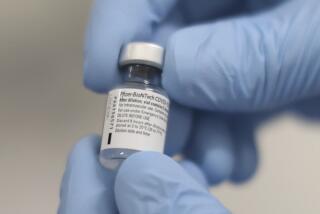UCI Medical Center to Take Part in Breast Cancer Study : Health: At least 50 local survivors of the disease will be recruited for a nationwide inquiry into whether a low-fat diet can prevent recurrence.
- Share via
ORANGE — UCI Medical Center next week will recruit survivors of breast cancer to take part in a nationwide study to determine if eating less fat will reduce recurrence of the disease.
UCI is one of 20 medical centers throughout the United States participating in the study, which will follow about 2,000 women, ages 48 to 78, who have had surgery and chemotherapy for breast cancer.
Dr. John Butler, chief of surgical oncology at UCI Medical Center in Orange, said that at least 50 volunteers will be needed locally for UCI’s portion of the study.
“I think it is a very important study (because) there is a lot of epidemiological and experimental information that suggests that decreasing fat intake will have a beneficial effect,” Butler said.
Without dietary change, breast cancer recurs in about 30% of cases, with the relapse rate lower for those who receive initial treatment at an earlier stage of the disease. “The majority of women who have a recurrence of cancer will die of the disease,” Butler said.
Dr. Ernst Wynder, a research physician at the American Health Foundation in New York City, is leading the nationwide study funded by the National Cancer Institute.
Women who participate will be randomly assigned to a control group whose fat intake will be limited to 30% of their total daily calories or to a test group whose diet will be restricted to 15% fat.
Wynder said that 15% was selected as an optimum level of dietary fat because it approximates the diet of women in China, where the occurrence of breast cancer among post-menopausal women is about one-eighth as frequent as among American women.
The American Cancer Society estimates that more than 1,700 new cases of breast cancer will occur this year in Orange County.
Even the women in the control group will have a healthier diet than the average American, whose diet is typically 37% fat, said Cynthia Smith, a nutritionist who will work with study participants.
The women eating the lowest-fat diet will be closely monitored and receive coaching in how to grocery shop, prepare meals and order from restaurant menus. They will also meet in support groups.
“Nobody can just drop to a 15% fat diet. It takes a lot of effort,” Smith said, adding that the low-fat diet will include an abundance of fruit, vegetables, bread and cereals and less red meat.
“Today, especially in Southern California, there are many new fat-free and reduced-fat products in the grocery store, including cookies, ice cream and yogurt. So (study participants) won’t be totally deprived of sweet things,” she said.
Participants will be expected to stick to their diets for a minimum of three years and perhaps as long as 10 years, since that is the period in which breast cancer tends to recur.
Butler said it will take five to 10 years before the success of the low-fat diet can be determined. He predicted that even if fat reduction does not prove effective in preventing cancer, it will enhance the overall health of study participants.






